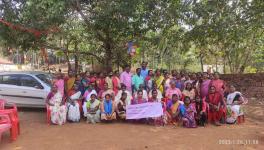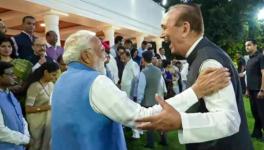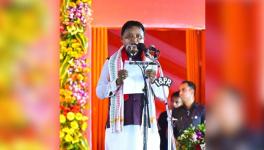Say No to Social Distancing, Yes to Physical Distancing
Representational Image.
Despite differences in approach, the one line of reasoning on which there is almost complete unanimity among individuals and nations is that the first measure to stop the spread of novel coronavirus, is to stay apart from one another and restrict personal movement, drastically if not completely.
In the initial period, COVID-19 – a neologism – was listed to be in the running for selection as the Oxford Dictionaries’ International Word of the Year. Most, however, felt 'social distancing', a combination of words, which although in use previously, had not become widely prevalent as now, caught the mood of the times better. But, in the third week of March, this word arrangement began losing out after realisation that it was inadvertently sending a wrong signal to users and listeners.
It is now a fortnight since the World Health Organisation decided to replace'social distancing' with 'physical distancing'. Dr Maria Van Kerkhove, COVID-19 Technical Lead at the WHO and an internationally acclaimed infectious disease epidemiologist, stated that the advice to practise social distancing was unintentionally sending the message that people had to socially disconnect from friends, family and other loved ones.
“We're changing to say physical distance and that's on purpose because we want people to still remain connected,” Kerkhove said at the regular media briefing on March 20. Despite alteration in terminology or popular jargon of a vital activity that has to be stressed several times over by everyone from medical caregivers, to policy experts and global statesmen, the word remains in vogue in many countries.
However, a negative impact of the continued usage of social distancing instead of advising people to practise physical distancing, will be felt most deeply in India, because of the history of social discrimination, antagonism, animosity and stigmatisation. Social distancing has been in practise for centuries, vertically as well as horizontally. Any form of official sanction will deepen existing social distancing practised routinely and with scant thought by most Indians.
While vertical social distancing has been practised on the basis of caste hierarchy as well as financial capacity – in recent years religious identity has also influenced choices of people staying away from other communities. Horizontal social distancing has also been witnessed among social and professional peer groups and is motivated by personal identity, habits and choices. This has particularly increased in recent decades which has witnessed a considerable rise in public support for divisive politics.
The WHO was driven by commitment that mental health of people undergoing the trauma of living through a pandemic "is just as important as (your) physical health." When the terminology switch was made, there was comprehension that while there was need to maintain physical distance, it was essential to remain mentally connected and deliberate on the next steps collectively.
Health officials were emphatic that social distancing simply does not put the emphasis where it belongs. They particularly warned individuals that despite living by themselves, the problem is amplified several times over in the case of individuals who are, by choice or circumstances, living alone; the virus can be overcome only by pooling together the wealth of global knowledge, talent and resources. More than at any time in history, this is when globalisation can work for a collective advantage.
In India however, social distancing stares at us in every village, town or city. In villages, there are demarcated bastis or settlements that are exclusive to particular castes. Most villages also have streets or a secluded part marked out for people from the scheduled castes and except for the purposes of cleaning lavatories, they are disallowed from entering localities inhabited by people from upper castes. There are also separate villages for Muslims in most parts of India. In cities, while segregated colonies always existed, there has been increased ghettoisation in recent decades.
A consistent campaign from the Union government and its leaders, beginning from thePrime Minister and moving downward, to popularise social distancing, would deepen vertical divides in Indian society. Caste-based discrimination and stigmatisation has historically prevented underprivileged sections of society from accessing social welfare programmes and securing either educational or employment opportunities. The fear is that a repeated call for social distancing during COVID-19 would shut the door on all welfare schemes that government has either already announced or would declare in future.
Already, across urban areas, there have been several reports of stigmatisation of those who tested positive for COVID-19. This tendency acquired virulence in the wake of the outbreak in Markaz Nizamuddin in the Indian capital following the Tablighi Jamaat's Ijtema. In the middle of the pandemic, the sangh parivar and its supporters secured a handy tool to demonise Muslims by blurring lines between supporters of the Jamaat and other Muslims.
BJP torch-bearers have criticised the Delhi government for releasing a data breakdown of COVID-19 positive cases under the head of 'special operations' or 'single source'. They argue that this classification head is aimed at hiding that "Covid19 is spreading because of Tabliqis (sic) and Jamaatis." The comment shows zero understanding of plurality of Muslim society and displays ignorance that members of Tabhligi Jamaat are not the same as those associated with the Jamaat-e-Islami or the Jamiat ulema-e-Hind.
As it is, Muslims in India have always been looked as a social or political monolith whereas the truth is a complete contrast. Call to practise social distancing is going to increase social exclusion of not just Muslims, but any person considered a contrarian.
In contrast to the Centre's mantra of social distancing, the state government in Kerala, which was the first to face the effects of the novel coronavirus, has campaigned for physical distancing and social solidarity. This approach enabled it to seek the support of not just religious organisations and its leaders but also to mobilise political outfits and local government institutions and forge partnerships. As a result, Kerala is also considered a model in terms of the way it has combated the pandemic.
The mass campaign that succeeded in popularising the slogan, 'break the chain' also had a pedagogical impact on society and stands in contrasts to the messaging done by the PM that has been restricted to ringing bells, clapping hands, beating plates and of course, lighting lamps.
The Centre's insistence on continuing to use social distancing underscores that its approach to tackling the crisis is the reverse of more rational methods deployed by other governments, including that of Kerala.
The situation is the opposite of the Bard's "What's in a name" poser. There is actually quite a bit in a name, at least in this instance. Instead of little importance, in this case, the nomenclature is all important. Physical distancing and social solidarity is in complete contrast to social distancing and mental isolation. The earlier we, including the Centre, get a hang of this, the better it would be for all.
The writer is a journalist and author. His first book was The Demolition: India at the Crossroads. His latest book is The RSS: Icons of the Indian Right. The views are personal.
Get the latest reports & analysis with people's perspective on Protests, movements & deep analytical videos, discussions of the current affairs in your Telegram app. Subscribe to NewsClick's Telegram channel & get Real-Time updates on stories, as they get published on our website.
























